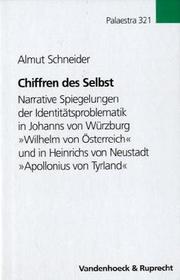| Listing 1 - 10 of 11 | << page >> |
Sort by
|

ISBN: 3525205945 9783525205945 Year: 2004 Volume: 321 Publisher: Göttingen: Vandenhoeck und Ruprecht,
Abstract | Keywords | Export | Availability | Bookmark
 Loading...
Loading...Choose an application
- Reference Manager
- EndNote
- RefWorks (Direct export to RefWorks)
Self in literature --- Narration (Rhetoric) --- History --- Johann, --- Heinrich, --- Technique --- Narration (Rhetoric) - History - To 1500 --- Johann, - von Würzburg, - active 1314 - Wilhelm von Österreich --- Johann, - von Würzburg, - active 1314 - Technique --- Heinrich, - von Neustadt, - active 13th century-14th century - Apollonius von Tyrland --- Heinrich, - von Neustadt, - active 13th century-14th century - Technique --- Johann, - von Würzburg, - active 1314 --- Heinrich, - von Neustadt, - active 13th century-14th century
Book
Year: 2004 Publisher: Vandenhoeck & Ruprecht
Abstract | Keywords | Export | Availability | Bookmark
 Loading...
Loading...Choose an application
- Reference Manager
- EndNote
- RefWorks (Direct export to RefWorks)
Book
Year: 1987
Abstract | Keywords | Export | Availability | Bookmark
 Loading...
Loading...Choose an application
- Reference Manager
- EndNote
- RefWorks (Direct export to RefWorks)
Book
ISBN: 3030167038 303016702X Year: 2019 Publisher: Cham : Springer International Publishing : Imprint: Palgrave Macmillan,
Abstract | Keywords | Export | Availability | Bookmark
 Loading...
Loading...Choose an application
- Reference Manager
- EndNote
- RefWorks (Direct export to RefWorks)
“The essays presented break a new path in the human sciences: there is not much written on the issue in focus and this perspective before. There may be bits here and there in introductory books on anthropological fieldwork, but I know of nothing that can compare with this new endeavor. This text offers an 'inverted anthropology' where what is foreign is an anthropologist coming in from abroad. This experience of acceptance of a stranger is made relevant for the more conventional debates on immigrant foreigners in various Western societies.” —Göran Aijmer, Professor at the Gothenburg Research Institute, University of Gothenbburg, Sweden “This book is absolutely timely, and quite unique in 'exoticizing' a debate that seems to be homemade in Europe and North America but, as the co-editors and authors show, is universal.” —Andre Gingrich, Director of the Institute for Social Anthropology, Austrian Academy of Sciences, Austria This book provides a uniquely positioned contribution to the current debates on the integration of immigrants in Europe. Twelve social anthropologists—“strangers by vocation”—reflect upon how they were taken in by those they studied over the course of their long-term fieldwork. The societies concerned are Sinti (northern Italy), Inuit (Canadian Arctic), Kanak (New Caledonia), Māori (New Zealand), Lanten (Laos), Tobelo and Tanebar-Evav (Indonesia), Banyoro (Uganda), Gawigl and Siassi (Papua New Guinea) and a township in Odisha (India). A comparative analysis of these reflexive, ethnographic accounts reveals as yet underrepresented, non-European perspectives on the issue of integrating strangers, enabling the reader to identify and reflect upon the uniquely Western ideals and values that currently dominate such discourse.
Immigrants --- Europe --- Emigration and immigration. --- Ethnology. --- Ethnography. --- Migration. --- Social Anthropology. --- Cultural Studies. --- Cultural anthropology --- Ethnography --- Races of man --- Social anthropology --- Anthropology --- Human beings --- Cultural studies. --- Immigration --- International migration --- Migration, International --- Population geography --- Assimilation (Sociology) --- Colonization
Book
ISBN: 9783030167035 Year: 2019 Publisher: Cham Springer International Publishing :Imprint: Palgrave Macmillan
Abstract | Keywords | Export | Availability | Bookmark
 Loading...
Loading...Choose an application
- Reference Manager
- EndNote
- RefWorks (Direct export to RefWorks)
Book

ISBN: 2858312494 2858312486 Year: 2017 Publisher: Paris : Presses de l’Inalco,
Abstract | Keywords | Export | Availability | Bookmark
 Loading...
Loading...Choose an application
- Reference Manager
- EndNote
- RefWorks (Direct export to RefWorks)
L’autorité, thème majeur de la philosophie politique, apparaît comme un mystère (ou une mystification) dans nos sociétés modernes où l’on déplore (ou célèbre) sa disparition, au moment même où les « relations de pouvoir » paraissent s’imposer dans certaines théories comme la clé ouvrant toutes les portes du savoir sociologique, par ses capacités infinies de dévoilement des intérêts cachés au cœur de toute relation sociale. Pourtant, à l’issue d’un examen approfondi, réunissant des lieux aussi divers que la Chine, l’Inde, la Nouvelle-Calédonie, la Nouvelle-Guinée, les Philippines, la Russie, la Tunisie et Wallis, des sociétés aux régimes politiques allant de l’empire à la « société sans État » en passant par la démocratie et des religions allant de l’islam au chamanisme, l’autorité se révèle être une dimension nécessaire et consubstantielle à la vie sociale, articulant et ordonnant les valeurs fondamentales qui régissent la pensée et l’action collectives. En plaçant chaque forme d’autorité observée dans le tout de chaque culture, ce travail dégage non seulement certaines conclusions quant à la nature de l’autorité, mais invite également à des considérations méthodologiques générales en soulignant les impasses des « anthropologies potestatives » pour lesquelles seuls les rapports de pouvoir sont au fondement de l’ordre social.
Anthropology --- autorité --- autorité/pouvoir --- holisme --- anthropologie politique --- postmodernisme --- pouvoir
Book

ISBN: 379171936X 379171872X 3791719130 9783791719375 9783791719382 9783791719399 9783791719405 9783791718729 9783791719139 3791719394 9783791719368 3791719386 3791719378 3791719408 Year: 2009 Volume: 3 Publisher: Regensburg: Friedrich Pustet,
Abstract | Keywords | Export | Availability | Bookmark
 Loading...
Loading...Choose an application
- Reference Manager
- EndNote
- RefWorks (Direct export to RefWorks)
Digital

ISBN: 9783110502633 9783110498509 9783110496987 Year: 2016 Publisher: Berlin ;; Boston De Gruyter Akademie Forschung
Abstract | Keywords | Export | Availability | Bookmark
 Loading...
Loading...Choose an application
- Reference Manager
- EndNote
- RefWorks (Direct export to RefWorks)
Digital

ISBN: 9783110280104 9783110280043 Year: 2012 Publisher: Berlin ;; Boston De Gruyter
Abstract | Keywords | Export | Availability | Bookmark
 Loading...
Loading...Choose an application
- Reference Manager
- EndNote
- RefWorks (Direct export to RefWorks)


ISBN: 9783110901344 9783110183399 Year: 2012 Publisher: Berlin ;; Boston De Gruyter
Abstract | Keywords | Export | Availability | Bookmark
 Loading...
Loading...Choose an application
- Reference Manager
- EndNote
- RefWorks (Direct export to RefWorks)
| Listing 1 - 10 of 11 | << page >> |
Sort by
|

 Search
Search Feedback
Feedback About UniCat
About UniCat  Help
Help News
News